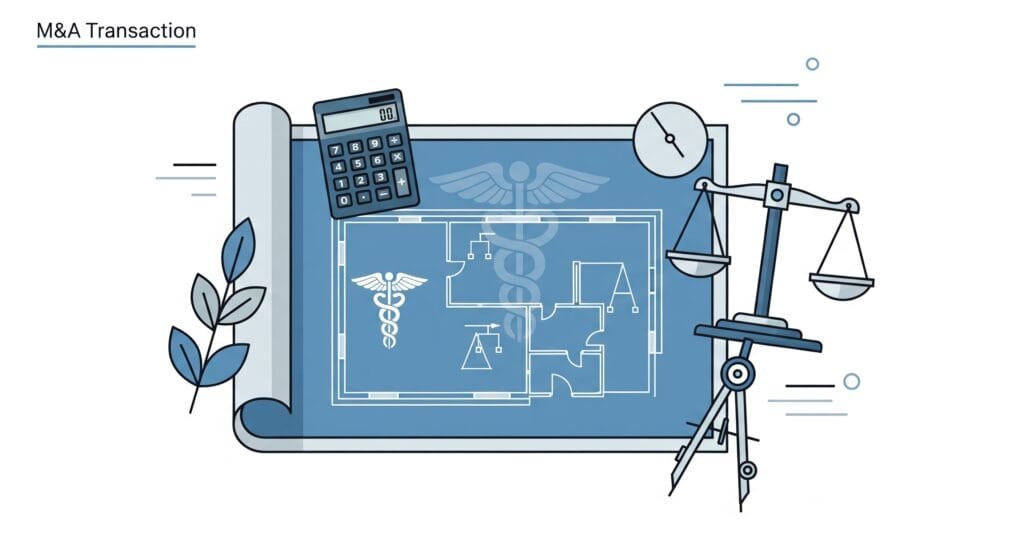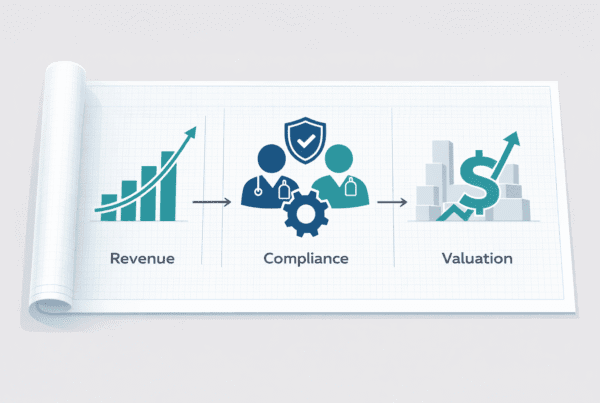
Successfully selling or acquiring a medical practice isn’t a solo endeavor. It requires assembling a specialized team of advisors who understand the unique complexities of healthcare transactions. This comprehensive guide explains each team member’s role and how to build the right advisory team for your healthcare M&A transaction.
Table of Contents
- Before You Start: Why Healthcare M&A is Different
- Your Core Advisory Team: The Essential Players
- Specialized Consultants: The Supporting Cast
- Building Your Team: Selection & Management
- Fee Negotiation Tips:
- Making It Work: Getting Maximum Value from Your Team
- Common Mistakes Practice Owners Make
- Your Next Steps: Building Your Advisory Team
- Working with SovDoc: Your Healthcare M&A Partner
Before You Start: Why Healthcare M&A is Different
If you’re considering selling your practice, here’s something to think about:
Healthcare M&A transactions fail at nearly twice the rate of other industries. Why? Because well-meaning practice owners often try to navigate complex regulatory requirements, valuation methodologies, and buyer relationships without the right expertise.
Unlike selling a restaurant or retail business, healthcare transactions involve:
- Complex regulatory compliance (Stark Law, Anti-Kickback Statute, HIPAA)
- Specialized valuation methods that account for reimbursement risk
- Buyer sophistication that demands institutional-grade due diligence
- Post-transaction integration challenges unique to clinical operations
The true cost of poor advisory selection isn’t just higher fees—it’s deals that fall apart, lower valuations, or regulatory issues that surface months after closing.
Your Core Advisory Team: The Essential Players
Transaction Advisors & Investment Bankers: Your Deal Orchestrators
What They Do: Your transaction advisor serves as the quarterback of your M&A process. M&A Healthcare Advisors supports successful transactions with sell-side representation, valuation and the resources of an investment bank, specifically targeting the unique needs of healthcare businesses . They handle everything from initial valuation through closing, including buyer identification, negotiation support, and process management.
Healthcare vs. General M&A Advisors: M&A advisory firms typically target middle- and small-market deals, while investment banking companies generally work with large transactions valued at billions of dollars . For mid-sized healthcare practices, this distinction matters significantly. Healthcare-specialized advisors understand reimbursement pressures, clinical workflows, and regulatory nuances that general advisors often miss.
When to Use Different Types:
| Practice Size | Best Advisor Type | Why |
|---|---|---|
| <$500K EBITDA | Boutique healthcare broker | Personalized attention, lower fees |
| $500K-$3M EBITDA | Mid-market healthcare advisor | Specialized expertise, established buyer networks |
| $3M+ EBITDA | Healthcare investment bank | Institutional buyer access, complex deal structures |
Key Selection Criteria:
- Track record with similar practice sizes and specialties
- Understanding of your local market dynamics
- Network of qualified healthcare buyers
- Experience with regulatory requirements in your state
To learn more about the differences between brokers and investment bankers, check out our detailed guide on Transaction Advisors Explained.
Legal Counsel: Your Regulatory & Risk Shield
Why Healthcare Attorneys Are Essential: Legal counsels significantly influence the decision-making process in M&A transactions, ensuring that each decision aligns with legal standards and supports the transaction’s strategic goals . In healthcare, this extends far beyond standard business law.
Healthcare-Specific Legal Complexities:
- HIPAA compliance during data room access and patient record transfers
- Stark Law and Anti-Kickback Statute compliance in deal structures
- Corporate practice of medicine laws that vary by state
- Provider credentialing and license transfer requirements
- Regulatory approval processes for certain transaction types
Due Diligence Coordination: Legal due diligence involves meticulous review of the target company’s legal standings, including contracts, intellectual property rights, employment agreements, and compliance with healthcare regulations . Your attorney doesn’t just review documents—they identify risks that could derisk the transaction or significantly impact valuation.
What to Look For:
- Experience with healthcare M&A transactions
- Understanding of your practice’s specialty-specific regulations
- Ability to work efficiently with your other advisors
- Track record of closing deals without unnecessary delays
For more details on legal counsel’s role in healthcare transactions, see our guide on Role of Legal Counsel in M&A.
Financial Advisors & Valuation Experts: Your Numbers Team
Valuation Expertise: Haverford Healthcare Advisors exemplifies this specialization, having performed over 2,000 separate valuation projects involving specialty physician practices and healthcare services businesses, establishing them as valuation specialists for numerous healthcare enterprises throughout the United States .
Key Responsibilities:
- Practice valuation using healthcare-specific methodologies
- Quality of Earnings (QofE) analysis to verify financial statements
- Deal structure optimization for tax efficiency
- Financing coordination when buyer financing is involved
Healthcare-Specific Considerations:
- Analysis of payor mix and reimbursement stability
- Quality metrics and their impact on future revenue
- Regulatory compliance costs and their effect on cash flow
- Clinical integration potential between buyer and seller
CPA Firms vs. Specialized Valuation Firms:
- CPA firms: Best for tax planning and compliance review
- Specialized valuation firms: Better for complex deal structures and contested valuations
- Many practices need both: CPAs for ongoing tax advice, specialists for transaction valuation
Learn more about valuation methodologies in our comprehensive guide on Role of Financial Advisors/Valuation Experts.
Specialized Consultants: The Supporting Cast
Post-Transaction Integration Specialists
Why Integration Matters: The success of an M&A transaction often hinges on effective integration of the two companies, with financial advisors providing guidance on post-merger integration, helping companies realize synergies, streamline operations, and align corporate cultures .
Healthcare-Specific Integration Challenges:
- Clinical workflow harmonization across different practice management systems
- Quality metric alignment to maintain performance incentives
- Staff credentialing and license verification processes
- Patient communication strategies to minimize attrition
- Technology platform consolidation including EMR integration
When You Need Integration Consultants:
- Multi-location practices with complex operations
- Transactions involving significant operational changes
- Deals where earnout payments depend on performance metrics
- Acquisitions requiring cultural integration between different practice styles
For more information on post-transaction planning, see our guide on Post-Transaction Consultants.
Compliance & Regulatory Experts
Beyond Basic Legal Review: While your attorney handles contract review and deal structure, compliance specialists focus on ongoing operational compliance that affects practice value.
Key Areas of Expertise:
- Revenue integrity audits to identify compliance risks
- Coding and documentation review to ensure billing accuracy
- Compliance program development for post-transaction operations
- Regulatory risk assessment across multiple practice locations
When They’re Essential:
- Practices with historical compliance issues
- Multi-state operations with varying regulatory requirements
- Transactions involving practices with government payor exposure
- Deals where compliance failures could trigger earnout clawbacks
Building Your Team: Selection & Management
Fee Structures: What to Expect
Understanding M&A Advisory Fees: These firms usually make their money through commission or percentage of the sale transaction, with fees varying depending on the type of company and its assessed value .
Typical Fee Ranges:
| Advisor Type | Fee Structure | Typical Range |
|---|---|---|
| Transaction Advisor | % of transaction value | 3-6% (higher for smaller deals) |
| Legal Counsel | Hourly + success fee | $500-800/hour + 0.5-1% |
| Valuation Expert | Fixed fee or hourly | $15K-50K depending on complexity |
| Integration Consultant | Fixed fee or monthly | $10K-100K depending on scope |
Fee Negotiation Tips:
Monthly or set fees often being optional components should be credited toward transaction fees if deals are ultimately completed
- Establish expense caps and approval processes for significant costs
- Consider different fee structures for buyers you identify vs. advisor-sourced buyers
For a detailed breakdown of fee structures across all advisor types, see our guide on M&A Advisor Fee Structures.
How to Select the Right Advisors
Essential Questions to Ask:
For Transaction Advisors:
- How many healthcare deals have you closed in the past 24 months?
- What’s your average time from engagement to closing?
- Can you provide references from sellers with similar practice sizes?
- Who are the specific buyers in your network for my specialty?
For Legal Counsel:
- What percentage of your practice focuses on healthcare M&A?
- Have you handled transactions involving [your specific compliance issues]?
- How do you coordinate with transaction advisors to avoid delays?
- What’s your approach to managing regulatory approval processes?
Red Flags to Avoid:
- Advisors who won’t provide recent references
- Unrealistic timeline or valuation promises
- Lack of healthcare-specific experience
- Unclear fee structures or scope definitions
- Potential conflicts of interest with buyers
For a comprehensive checklist of questions to ask potential advisors, see our guide on Questions to Ask M&A Advisors.
Managing Conflicts of Interest
Common Conflicts in Healthcare M&A:
- Advisors representing multiple competing practices
- Financial relationships between advisors and potential buyers
- Undisclosed ownership interests in buyer organizations
- Referral relationships that might influence advice
Protecting Your Interests:
- Request full disclosure of all potential conflicts
- Understand how advisors manage competing client relationships
- Ensure your engagement letter includes exclusivity provisions where appropriate
- Regularly assess whether advisor incentives align with your goals
Learn more about identifying and managing conflicts in our guide on Conflicts of Interest in M&A Advisory.
Making It Work: Getting Maximum Value from Your Team
The Engagement Process
Setting Clear Expectations: Engagement letters with investment bankers or business brokers are important components of M&A transactions that, despite appearing simple, contain essential terms that should be carefully negotiated to protect client interests .
Key Engagement Letter Terms:
- Detailed scope of services for each advisor
- Communication protocols and reporting requirements
- Performance metrics and timeline expectations
- Fee structures and expense management
- Termination clauses and transition procedures
Communication Protocols:
- Weekly team updates during active phases
- Clear decision-making authority and approval processes
- Single point of contact for buyer communications
- Regular progress reviews against timeline milestones
For more details on the engagement process, see our guide on The M&A Advisor Engagement Process.
Coordinating Multiple Advisors
Who Leads the Process: Typically, your transaction advisor serves as the lead coordinator, but you maintain ultimate decision-making authority. Establish clear communication flows to avoid confusion and ensure all advisors are working toward the same objectives.
Avoiding Common Coordination Problems:
- Information silos: Ensure all advisors have access to relevant information
- Scope overlap: Clearly define responsibilities to avoid duplication
- Timeline conflicts: Coordinate advisor schedules around key milestones
- Mixed messages: Designate a single spokesperson for buyer communications
Common Mistakes Practice Owners Make
Selection Errors
Choosing Based on Price Alone: The cheapest advisor often costs the most in the long run. Focus on value creation potential rather than just fee minimization. A skilled advisor who increases your valuation by 10% easily pays for the difference in fees.
Using Generalist vs. Healthcare Specialists: General M&A advisors often miss healthcare-specific value drivers and risks. The learning curve for healthcare regulations and buyer behaviors can add months to your timeline and reduce final valuations.
Not Checking References Thoroughly: Ask for references from sellers, not just buyers. Speak with clients whose deals closed and those whose deals didn’t. Understand why transactions failed and what role the advisor played.
Management Issues
Poor Communication and Coordination: Without clear communication protocols, advisors work in silos, buyers receive conflicting information, and timelines slip. Establish regular check-ins and single points of contact early in the process.
Unclear Scope Definitions: Overlapping or undefined responsibilities lead to finger-pointing when problems arise. Document who does what and when, especially for critical path activities like due diligence coordination.
Your Next Steps: Building Your Advisory Team
Action Items for Practice Owners
Phase 1: Assessment (Weeks 1-2)
- Evaluate your practice’s readiness for M&A
- Identify specific advisory needs based on practice complexity
- Develop budget parameters for advisory fees
- Create initial list of potential advisors by category
Phase 2: Selection (Weeks 3-6)
- Interview at least 3 transaction advisors
- Vet legal counsel with healthcare M&A experience
- Identify valuation expert if needed for complex situations
- Check references and validate track records
Phase 3: Engagement (Weeks 7-8)
- Negotiate engagement letters with selected advisors
- Establish communication protocols and reporting requirements
- Set timeline expectations and key milestones
- Begin pre-market preparation activities
Timeline Considerations
Typical Advisory Team Assembly Timeline:
- Transaction Advisor Selection: 2-4 weeks
- Legal Counsel Engagement: 1-2 weeks
- Valuation Expert (if needed): 1-2 weeks
- Specialized Consultants: Ongoing as needed
Planning Considerations:
- Start advisor selection 3-6 months before planned market launch
- Allow extra time for advisor coordination in complex transactions
- Plan for potential advisor changes if initial selections don’t work out
- Consider post-transaction advisor needs in initial selection
Working with SovDoc: Your Healthcare M&A Partner
At SovDoc, we understand that assembling the right advisory team is crucial to maximizing your practice’s value and ensuring a smooth transaction. We’ve closed nearly $200 million in healthcare transactions by coordinating specialized advisory teams that work seamlessly together.
How We Help:
- Advisory Team Coordination: We work with your existing advisors or help you select new ones
- Process Management: We ensure all team members stay aligned on timeline and objectives
- Specialized Expertise: Our healthcare focus means we understand the nuances other advisors might miss
- Value Optimization: We help identify and address issues before they impact your valuation
Our Approach: Rather than replacing your existing advisors, we coordinate the entire process to ensure maximum value realization. We’ve worked with legal counsel, valuation experts, and integration specialists across dozens of transactions.
If you’re ready to explore your options or need help selecting the right advisory team for your practice, we’re here to help. Contact us for a confidential discussion about your specific situation and advisory needs.
Remember: Building the right advisory team isn’t just about minimizing costs—it’s about maximizing the value and certainty of your transaction outcome. The investment in quality advisors typically pays for itself through higher valuations, faster timelines, and reduced post-closing issues.
Your practice represents years of hard work and dedication. Make sure you have the right team in place to realize its full value.



